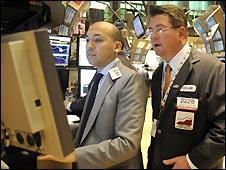US markets plunge on continuing Greek debt concerns
- Published

Traders look at a screen with disbelief as stocks start to plunge
US stockmarkets have plunged in New York as concerns about high levels of European government debt continued to shake investor confidence.
Stocks fell steeply over Greece's debt problems, and falls may have been made worse by computer-driven trade.
At one point the Dow Jones was down by more than 9%, its worst fall since 1987, before starting to recover.
At close in New York the Dow Jones was down about 3.20%, the S&P down 3.24%, and Nasdaq 3.44%.
The BBC's Business Editor Robert Peston said the market panic had been precipitated by "fear of a knock-on from Greece and other European countries on the global financial system".
Meanwhile, there were rumours in the financial world that the drop may have been caused by an erroneous "fat finger" trade being made at a big Wall Street bank.
Jobs report
The tech-based Nasdaq index said it was scrutinising trades made between 2pm and 3pm.
Shares in consulting firm Accenture fell to 4 cents after it had closed at $42.17 on Wednesday. It later rebounded and closed at $41.09, down just over $1.
The NYSE said the fall had not been caused by a problem with the exchange's trading systems, and the Nasdaq said it was reviewing its trades with other trading networks.
And Procter & Gamble was investigating the fall in its stock at one stage by 37%.
As well as shares falling, bond prices increased and the dollar fell by 6% against the yen.
Oil prices also fell, to levels not seen since February, with benchmark crude losing $2.86 to settle at $77.11 a barrel in New York.
There will be close attention paid now to Friday's US employment report, showing payroll levels for April, and whether this will calm the markets.
'Panic sell'
There are market worries that Greece may default on its debt and that trouble there could spread to other parts of Europe, including Spain or Portugal.
Investors were disappointed that earlier today the European Central Bank did not take fresh measures, such as buying Greek bonds, to help stop the Greek debt crisis.
"Right now you just have a panic sell," said Keith Springer, president of Capital Financial Advisory Services in Sacramento, California.
"It could be a long-term negative for stock market because it could mean the long-term high is in place. It's very likely we've seen the highs for this cycle."
However, others said the stock volatility could have been exacerbated by electronic trading issues rather than worries about Greece.
'Machines took over'
"This is an electronic market where bids can be cancelled at the flick of a button, and everyone cancelled at the same time," said Joe Saluzzi, of Themis Trading in New Jersey.
"We should be down big today, but not 1,000 points. This is an equity market structure issue, there's no major problem going on."
Computer trading is thought to have cranked up the losses, as programmes designed to sell stocks at a specified level came into action when the market started falling.
"I think the machines just took over," said Charlie Smith, chief investment officer at Fort Pitt Capital Group.
"There's not a lot of human interaction. We've known that automated trading can run away from you, and I think that's what we saw happen today."